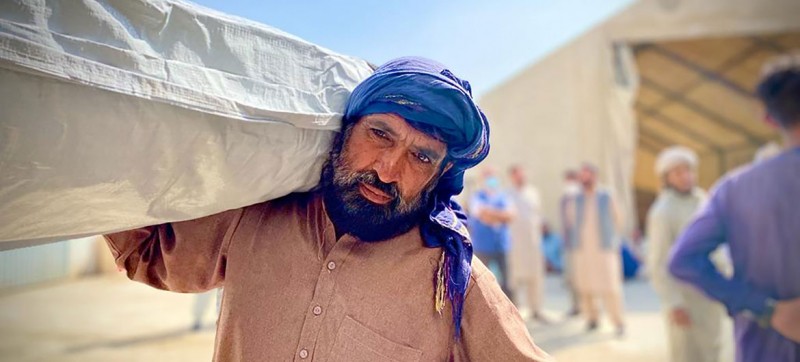In Afghanistan, 23 million million people are facing extreme levels of hunger while 3.5 million have been displaced by conflict. Conflict, climate change and COVID-19, have created a perfect storm of challenges facing refugees, displaced people and their hosts, UN High Commissioner for Refugees, Filippo Grandi, told the Security Council on Tuesday. The deadly mix has increased forced displacement and increased hardships, while the climate emergency has fuelled conflict in Sahel, he said. Underlining the importance of putting the climate emergency “front and centre” of Security Council’s agenda, the top UNHCR official noted that “the multilateral system has has probably never been so important”, nor so prone to failure. Acknowledging instability, insecurity, famine and natural disasters, Mr. Grandi added forced displacement, manipulation and irrational reactions to the list. Among other things, failure compels humanitarians to work in complex and uncertain situations that increase humanitarian needs. As cases in point, the UNHCR chief highlighted Myanmar, Sudan, Yemen and, most starkly, Afghanistan. He drew attention to the fact that of the 39 million people living in Afghanistan, 23 million are facing extreme levels of hunger while 3.5 million have been displaced by conflict – 700,000 this year alone. The politicization of humanitarian and refugee work is another form of failure, according to Mr. Grandi, who warned that humanitarian efforts are paralyzed by conflicting political agendas. Internally displaced children in Kandahar Province, Afghanistan. The High Commissioner shared his eye-witness account of how humanitarians in Afghanistan are stepping up, noting that UNHCR continues to reach 60,000 IDPs each week. But humanitarian aid “cannot replicate the role of States”, save economies, or replace political solutions he reminded. While recognizing the need for a delicate balance, Mr. Grandi raised his concern that slow progress is sparking an uptick in Afghans trying to leave country. And the deeper the implosion, the greater the outflow. Edit Meanwhile, enhanced aid is imperative for the urgent needs of winter; to stem major outflows; and stepped-up support to its neighbours, particularly Iran and Pakistan. At the same time, the UN official noted that conflict, lack of resources and the slow collapse of Lebanon have worsened the humanitarian situation in Syria.Failure’s many faces

Understanding Afghanistan
Syrian complexities
I told the #SecurityCouncil today that saving people’s lives cannot wait for political solutions — but unless conflicts are solved (with more unity and more determination) millions of people will continue to be exposed to uncertainty and fear, and forced displacement will grow. pic.twitter.com/tdgS6p0xfZ
— Filippo Grandi (@FilippoGrandi) December 7, 2021
During his visit in October, Mr. Grandi recalled growing queues for bread and fuel and a lack of services and livelihoods, especially outside the capital Damascus.
And amidst political complexities, slow progress in securing solutions is increasingly condemning millions to unnecessary hardship.
If reconstruction must wait for a political agreement, he underscored that humanitarian aid must encompass basic needs.
For Syrians to return to their country, Government cooperation is needed to work through legal and security obstacles as well as donor support for the country and its neighbours, including Lebanon.
Ethiopia crisis
An inability to make peace ramps up humanitarian work in active conflict or crisis situations while rising expectations on what can be delivered – even as options decrease on what can realistically be done.
Mr. Grandi observed that Ethiopia today is the most significant example of this.
For 13 months UNHCR has been struggling to deliver aid to populations in Tigray, Afar, Amhara and other hotspots, as combatants focused on military solutions create some of “the worst possible humanitarian conditions” to operate in.
Meanwhile failed political mediations have left 20 million people in need, and four million displaced as humanitarians, struggling to reach people with erratic, inadequate and dangerous access, are unfairly accused of taking sides, he said.
Unite for solutions
Although forced displacement continues to be driven mostly by conflict and crisis, the High Commissioner said he understood the complexity of finding political solutions to humanitarian aid delivery issues.
However, responding has become expensive, he said, noting that next year, humanitarian needs will exceed $41 billion.
As UNHCR multiplies channels of support through the Global Compact on Refugees, pledges made at Global Refugee Forum and growing involvement of new partners, Mr. Grandi told the Council that he had earlier asked donors to contribute nearly $9 billion towards its work.
“Failure to find solutions…will contribute to…less manageable human mobility, a challenge that that is evident in many countries”, he said.




Comments are closed.